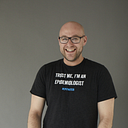Are Standing Desks Good For Your Health?
How health interventions can be much more complicated than you might think
The modern world is a wonderful place. I can work, eat, socialize, enjoy a wide range of entertainment, and sleep all without moving for days. If we invented a comfortable bed-toilet, I could probably stay there indefinitely.
I wouldn’t, but I could.
But this amazing convenience comes with its own array of new health risks. It turns out that eating pizza seven nights a week while spending 8+ hours sitting in front of a screen actually has some health risks too. Over the last couple of decades, the evidence has been building that our increasingly sedentary lifestyles are a huge problem for our health.
One of the biggest single health risks that has been identified is that sitting down for long periods of time — such as at an office desk or in a gaming chair — carries with it long-term health risks. Things like depression, diabetes, and heart disease are linked to sedentary behavior, which is not entirely surprising when you consider that these diseases are also linked with being overweight and a lack of exercise.
Basically, sitting down a lot is bad for your health.
Enter, the standing desk. Something that people have been yelling a lot about recently, because apparently they may not be as good for your health as you think.
Standing For Days
The basic idea behind standing desks is pretty simple: sitting is bad for you, so don’t do it. Standing burns (a few) more calories per hour than sitting, and doesn’t have the same association with depression, so it should mitigate against the negative effects!
Right?
Well, maybe.
The problem here is something you see all the time in public health. There’s a really complex problem — people are no longer getting much exercise in their lives — and to we’re proposing an incredibly simple solution. It’s like trying to fix your car engine with some duct tape and a prayer.
And to top it all off, we’ve got the new scary study that every news source has cheerfully screamed to the ether.
Because, in a shocking twist, it turns out that standing might not be that great for us either.
The Science
The new study that everyone has been talking about is a very simple analysis of the potential effects of standing for a long time. Basically, the researchers took 20 people and got them to stand in front of a desk doing tasks for ~2 hours. They found that standing caused people to be sore, with longer standing times associated with more soreness. There was also a mixed impact on cognition, which means that the people improved their creativity a little bit but also were slower to answer questions when asked.
In other words, standing desks didn’t do so well.
There are some important caveats to this study that a lot of articles missed. Firstly, it’s 20 people. That’s, well, nothing. It’s a small enough sample size that it’s hard to conclude much from the results except “More research is needed”, which is the worst of all taglines.
Also, there was no control group. It’s entirely possible that some of these issues would be seen in both sitting and standing groups regardless of how they were doing their work. We just don’t know.
BUT, and this is where all this research gets fun, this study lines up very well with a large number of other pieces of research.
There’s plenty of evidence that standing for long periods of time is bad for you. It causes muscle pain, swelling, joint pain, all the lovely things that most people want to avoid.
It’s also not clear that standing desks have any positive benefit at all, with research on the subject being of terrible quality and often finding no benefit anyway. A large study published in 2016 from the Cochrane foundation — usually considered the ‘gold standard’ for medical research — found that there is no clear evidence that standing desks are useful for your health at all. This isn’t surprising, considering that standing desks only reduce the time that people are seated by about half the recommendation from experts.
Basically, standing desks may not be great for your health after all.
Being Healthy At Work
We know sitting is bad for us. There’s now evidence that a simple fix like standing desks is unlikely to help, and may in fact be harmful to boot.
What can you do to be healthy?
It turns out, this is a seriously difficult question.
Reducing sitting time is still a recommendation. Having walking meetings is one suggested method, but just like standing desks the evidence isn’t great. Doing things at work is really hard, because you have to change some deeply embedded habits that are also related to your income.
The best solutions appear to be changing the way that we work as a society. The Netherlands, despite being as developed as any European nation, has much lower rates of sedentary behavior due to their country-wide effort to promote active transport. All those bikes in Amsterdam? They’re not just a fun tourist attraction. They also improve population health immeasurably.
Trying to improve your health at an individual level is a huge uphill struggle. You can incorporate extra walking into your life — I do — but it takes constant effort to maintain.
The bottom line is that standing desks will never be the solution to our sedentary worries. They are exhausting to use, and may cause problems in and of themselves.
If we want to really solve our sitting crisis, we need to look to solutions that involve changing how we function as a society. Bicycle lanes, walking paths, active transport cities: these are the complex fixes to a complex problem.
Standing desks are just another health hype.
It’s time we did something more.
